SCP0038
Amyloid β 1-42 rat
≥90% (HPLC)
Sinónimos:
β-Amyloid 1-42, Amyloid for Rat, Rat Amyloid β 1-42
Iniciar sesiónpara Ver la Fijación de precios por contrato y de la organización
About This Item
Fórmula empírica (notación de Hill):
C199H307N53O59S1
Peso molecular:
4417.95
Código UNSPSC:
12352200
NACRES:
NA.32
Productos recomendados
Análisis
≥90% (HPLC)
formulario
lyophilized
composición
Peptide Content, ≥75%
condiciones de almacenamiento
protect from light
temp. de almacenamiento
−20°C
Amino Acid Sequence
Asp-Ala-Glu-Phe-Gly-His-Asp-Ser-Gly-Phe-Glu-Val-Arg-His-Gln-Lys-Leu-Val-Phe-Phe-Ala-Glu-Asp-Val-Gly-Ser-Asn-Lys-Gly-Ala-Ile-Ile-Gly-Leu-Met-Val-Gly-Gly-Val-Val-Ile-Ala
Descripción general
Amyloid β (Aβ) 1-42 is the major Aβ species in the amyloid plaques that develop in the case of Alzheimer′s disease (AD). It has a cross-β structure with parallel, in-register β-sheets.
Aplicación
Amyloid β 1-42 rat has been used as an amyloid β (Aβ) oligomer in intracerebroventricular (ICV) injection/intra-hippocampal infusion to establish the Alzheimer′s disease (AD) model in rat.
Acciones bioquímicas o fisiológicas
Amyloid β 1-42 forms amyloid fibrils more readily compared to Aβ(1–40), in vitro. Aβ1-42 injections are known to cause brain dysfunction indicating learning and memory deficits. Amyloid β (Aβ) refers to peptides derived from amyloid precursor protein that vary in length from 37–43 amino acids. Aβ(s) peptides, their peptide fragments, and mutated fragments are used to study a wide range of metabolic and regulatory functions including activation of kinases, regulation of cholesterol transport, function as a transcription factor, and regulators of inflammation. Aβ(s) peptides and their peptide fragments are also used to study oxidative stress, metal binding, and mechanisms of protein cross-linking in the context of diseases such as Alzheimer′s disease and neurodegeneration.
Código de clase de almacenamiento
11 - Combustible Solids
Clase de riesgo para el agua (WGK)
WGK 3
Punto de inflamabilidad (°F)
Not applicable
Punto de inflamabilidad (°C)
Not applicable
Certificados de análisis (COA)
Busque Certificados de análisis (COA) introduciendo el número de lote del producto. Los números de lote se encuentran en la etiqueta del producto después de las palabras «Lot» o «Batch»
¿Ya tiene este producto?
Encuentre la documentación para los productos que ha comprado recientemente en la Biblioteca de documentos.
Los clientes también vieron
Jing Wang et al.
Molecular medicine reports, 23(6) (2021-04-22)
Ginkgolide B (GB), the diterpenoid lactone compound isolated from the extracts of Ginkgo biloba leaves, significantly improves cognitive impairment, but its potential pharmacological effect on astrocytes induced by β‑amyloid (Aβ)1‑42 remains to be elucidated. The present study aimed to investigate the
Enes Akyuz et al.
Biomedicines, 8(3) (2020-03-19)
Alzheimer's disease (AD) is a progressive neurodegenerative disorder with a complex etiology and characterized by cognitive deficits and memory loss. The pathogenesis of AD is not yet completely elucidated, and no curative treatment is currently available. Inwardly rectifying potassium (Kir)
Zhifeng Tian et al.
Journal of integrative neuroscience, 18(3), 309-312 (2019-10-12)
Alzheimer's disease is pathologically characterized by the presence of senile plaques and neurofibrillary tangles in the central nervous system. Amyloid β-protein is toxic to neurons and induces phosphorylation of Tau protein, which accumulates in paired helical filaments and leads to
Maryam Bagheri et al.
Neurobiology of learning and memory, 95(3), 270-276 (2010-12-15)
Alzheimer's disease (AD) is a debilitating neurodegenerative disorder characterized by increased β-amyloid (Aβ) deposition and neuronal dysfunction leading to impaired learning and recall. Ageing, heredity, and induced oxidative stress are among proposed risk factors. The increased frequency of the disease
Aynun N Begum et al.
Journal of Alzheimer's disease : JAD, 15(4), 625-640 (2008-12-20)
The rat amyloid-beta (Abeta) intracerebroventricular infusion can model aspects of Alzheimer's disease (AD) and has predicted efficacy of therapies such as ibuprofen and curcumin in transgenic mouse models. High density lipoprotein (HDL), a normal plasma carrier of Abeta, is used
Nuestro equipo de científicos tiene experiencia en todas las áreas de investigación: Ciencias de la vida, Ciencia de los materiales, Síntesis química, Cromatografía, Analítica y muchas otras.
Póngase en contacto con el Servicio técnico
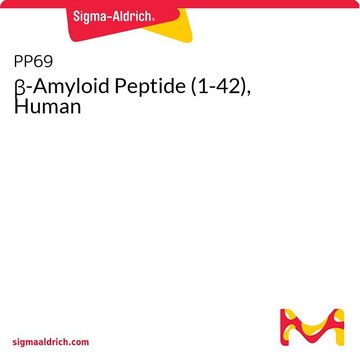




![[Gly22]-Amyloid β 1-42 Arctic human](/deepweb/assets/sigmaaldrich/product/images/222/254/58bfa018-4218-48a8-957d-f4d67366a533/640/58bfa018-4218-48a8-957d-f4d67366a533.jpg)

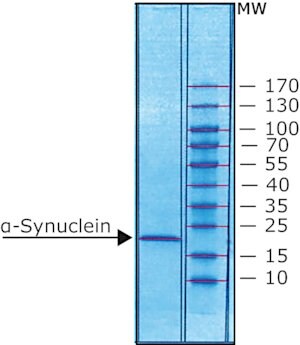
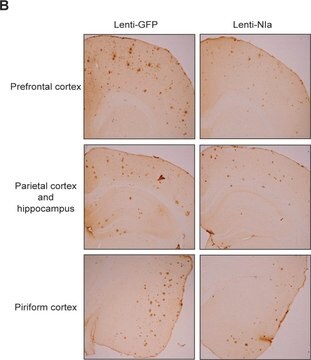



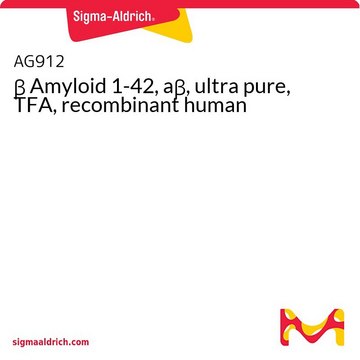

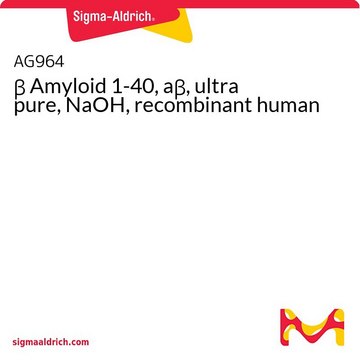
![[Ala28]-Amyloid β 25-35 ≥95% (HPLC)](/deepweb/assets/sigmaaldrich/product/images/306/938/dd9f7c72-cfca-4ea3-8e10-a7a2a7994639/640/dd9f7c72-cfca-4ea3-8e10-a7a2a7994639.jpg)